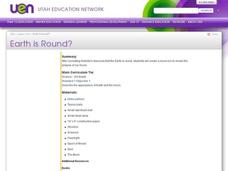Curated OER
Earth is Round?
Third graders discuss how Aristotle concluded that the Earth was round. As a class, they review theories about the Earth's shape and describe how life on Earth would be different if it were flat. Individually, they make a moon book in...
Curated OER
Lunar Lollipops
Students simulate the phases of the moon using a lamp and styrofoam balls. In this lunar phases lesson, students stand around a lamp and act as Earth. They hold styrofoam balls and rotate to show the phases of the moon.
Curated OER
28 Days - The Lunar Cycle time line
Third graders create a labeled lunar diagram time line illustrating the lunar cycle using Internet resources. An assigned date/month is given to each student, and an online Moon Phase calculator assists them with their drawings.
Curated OER
Where the Past and Present Meet
For this planets worksheet, students are given clues from Greek mythology to find the names of planets and moons. They use an on line source to find the answers.
Curated OER
Our Solar System
In this solar system worksheet, students complete a database comparing the 9 different planets' mass, surface temperature, rotation period, orbital period, moons, and distinguishing features. This worksheet is a graphic organizer.
Curated OER
Lunar Cratering-Probability and Odds
In this lunar cratering worksheet, students use probability to determine the outcome of coin flipping. They use this to represent the probability that asteroids will strike the moon in already cratered areas.
Curated OER
Wax On, Wane Off
Learners explore the Earth's only natural sattelite, the moon. They view a demonstration using tennis balls of the waxing crescent moon, waxing gibbous moon and a lunar eclipse.
Curated OER
Line Ups
Fifth graders describe the lunar cycle. develop an understanding of the order and phases of the moon. Each student in a team contributes orally in order to make a line up of the moon phases in order.
Curated OER
Calculating the Moon's Width
Sixth graders measure the width of the Moon. In this Moon measurement lesson, 6th graders observe the Moon and complete a formula to calculate the width of the Moon.
Curated OER
Exploring the Far Side of the Moon
Help your classes better understand how our nearest celestial neighbor affects our world.
American Museum of Natural History
Beyond Planet Earth
Scholars take a journey through space with 16 eye-catching images. Along the way, learners read captions starting with the moon, then move onto asteroids, Mars, and Jupiter.
University of Colorado
Phases of Charon
Pluto, although no longer considered a planet, has five moons. Pluto's moon, Charon, is the focus of a resource that describes how the moon is viewed from the surface of Pluto. Photos help individuals see how Charon would look at...
University of Colorado
The Jovian System: A Scale Model
Jupiter has 67 moons! As the seventh in a series of 22, the exercise shows learners the size and scale of Jupiter and its Galilean moons through a model. They then arrange the model to show how probes orbited and gathered data.
PBS
Reading Adventure Pack: Folktales
Following a reading and thorough discussion of books—Anansi the Spider: A Tale from the Ashanti by Gerald McDermott and The Moon Book by Gail Gibbons—scholars complete three activities. First, they use playdough or cookie dough to create...
Johnson County Community College
Treasured Stories by Eric Carle
Explore the works of Eric Carle with a set of four lessons focused around the stories, Brown Bear, Brown Bear, What Do You See?, Papa, Please Get the Moon For Me, and The Very Hungry Caterpillar. Young readers develop a storyboard,...
Curated OER
The Moon Book
In this moon worksheet, students read the book The Moon Book and list facts about the moon and draw eclipses. Students list 10 facts and draw 3 kinds of eclipses.
Journey Through the Universe
How Far is Far?
The earth only revolves around one thing — and it's not any of your pupils. The lesson includes two activities dealing with the distance to the sun and the moon. First, scholars create a pin hole camera and use the rules of similar...
Curated OER
Cow Jumped Over the Moon
In this "Cow Jumped Over the Moon" worksheet, students color in an illustration of the Cow Jumping Over the Moon. The also color in the Cat and the Fiddle, the Dog, and the Knife and Spoon.
Curated OER
Earth And Its Moon
In this earth and moon worksheet, students read 4 different statements about the placement of the earth and moon during different times. Students write in the effect of each of these statements. This worksheet is a graphic organizer.
Curated OER
Thirteen Moons Language Lesson
First graders pronounce and define the Thirteen Moon Cycles in Oneida language. In this multicultural literacy and calendar instructional activity, 1st graders view a video clip in which Oneida elder speakers say the name of each moon...
101 Questions
Speed of Light
How quickly does light travel long distances? A short video simulates light going from the earth to the moon at two different paces. Scholars relate the distance to the rate to understand which simulation is correct.
American Museum of Natural History
Field Trip: Space Flight
Take a virtual trip to infinity and beyond. Pupils watch a space visualization that leaves Earth and heads to the ISS and then follows the Apollo missions to the moon. Scholars view detailed images of the space station and its different...
Curated OER
The Moon's Density-What's Inside?
In this moon's density worksheet, students solve 4 problems about the Moon and a model planet. They find the Moon's density and they find its volume. They make a model of a planet's interior and use its mass and radius to find the...
Curated OER
Water on the Moon!
For this moon worksheet, students read about the data collected from the Deep Impact/EPOXI and Cassini missions to the moon that have detected the presence of hydroxyl molecules under the moon's polar craters. Students solve 4 problems...
Other popular searches
- Walk Two Moons
- Moons Gravity
- Moons Craters
- Walk Two Moons Foreshadowing
- Walk Two Moons Novel
- Walk Two Moons Questions
- Moons, Comets, Asteroids
- Moon's Phase and Position
- Character Walk Two Moons
- Stars and Moons
- 15 Moons of Uranus
- Moons Surface and Structure

























